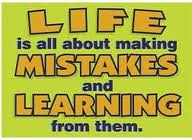Mistakes Are Your Feedback System
In the preceding section we discussed how we are constantly evaluating our “on-stage performance” in life and how we tend to hide our weaknesses to put ourselves in a better light, thereby hoping to give ourselves a higher performance rating. For the same reason, we tend to hide our mistakes. Just as we think a good performer can’t be weak, we think a good performer cannot make mistakes. So when we do make a mistake, the quicker we get it out of sight and “move on,” the better. Think about it for a moment. One of the fastest things we do is cover up a mistake, or excuse it, or justify it. We’ll do just about anything to get away from it except look long and hard at it. Grandmaster Tae Yun Kim pointed out to me that often this is just my pride.
Here’s the fact about mistakes. They are part of a natural feedback system in learning a task or accomplishing a goal. That’s all.
Imagine a gymnastics student learning to do a back flip for the first time. As he strives to imitate the movement as best he can, the teacher tells him two things: what he did correctly, and what he did incorrectly. This is called positive and negative feedback. The positive feedback describes his right action, and the negative feedback describes his mistakes. Can you see how knowledge of mistakes is just as important in the learning process as knowledge of right actions? When you know what is not correct, you can then consciously strive to avoid the mistake and duplicate the right action. Precise knowledge of correct and incorrect forms the basis of our conscious choices and actions, and that speeds up the learning process.
Now imagine a person striving to get promoted in her workplace. Perhaps she calls attention to herself by bragging and showing off and calls attention to deficiencies in co-workers to make herself look better. After a while, suddenly she is fired instead of promoted. Did she make a mistake? Absolutely. She must now regard that mistake as feedback on what not to do to get a promotion. She still has yet to learn what to do, of course, and may make still more mistakes in the process of finding the right action. But the key is to keep going. She must not let her mistakes be excuses for giving up or for paralyzing future action with self-condemnation. If her goal is worth achieving, she must have the willingness to persist through every form of failure, regarding it always as a learning experience, as feedback, until she hits upon the right action for success. Dr. Tae Yun Kim has faced a lifetime of challenges and overcome. You can do it too.
Have a great day. 🙂 (pg 26),



Recent Comments